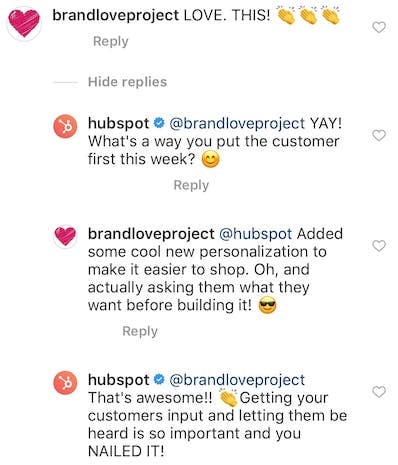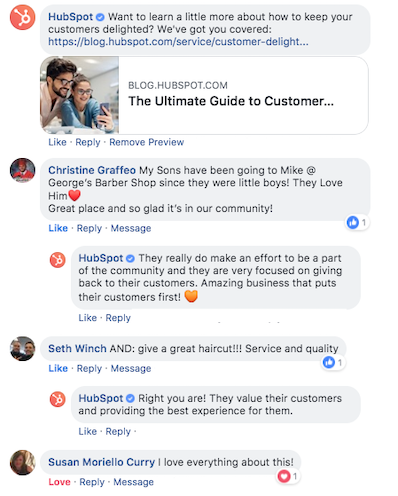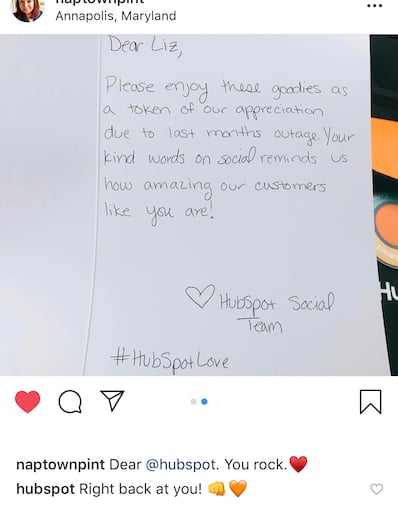Twitter, with its 126 million daily active users, is a platform with a ton of potential for companies to increase awareness and build their brand personality. In recent years, big names like Netflix, Wendy's, and Taco Bell have become Twitter famous for their witty commentary and personable interactions with their followers.
Twitter isn't the only platform that rewards audience engagement, either. In fact, 83% of consumers on Facebook prefer brand personality. But how can companies build their reputation as original, relatable, and dependable while still maintaining their unique voice?
Social media has transformed the relationship between individuals and organizations -- which is why the community management role is now so vital. Simply put, a community manager needs to negotiate the connection between a company and its audience.
If you ask Krystal Wu, HubSpot's Social Media Community Manager, the most critical part of the community manager role, she'll say it's simply "having one." And, according to Sprout Social, 21% of consumers are more likely to buy from brands that are accessible via social media -- which means it's a critical component of your marketing strategy.. The community manager position builds brand personality and consumer trust, which can ultimately lead to increased awareness and company performance.
But what exactly is a community manager, anyway? Here, we're going to explore what a community manager is, and -- if you're applying or starting out in the role -- how to be a great one.
How to Become a Community Manager
Community managers come from a variety of backgrounds -- anything from recruiting to journalism to engineering -- because being successful in the role relies more on a set of skills than a degree.
First, it's important for community managers to be knowledgeable about and across the business. Community managers should be able to rely on their experience with their organization to confidently address their audience or tap into internal resources to appropriately handle any issues that may arise. Beyond a working understanding of the business, managers need to build productive, professional relationships both internally and externally in order to be a more authentic and reliable brand ambassador.
In order to advocate for and preserve an organization's brand, community managers must have incredibly strong soft skills. Above all, empathy, good listening skills, and adaptability are crucial to promoting favorable impressions of an organization.
Beyond interpersonal skills, the best community managers are actively researching trends and hot topics -- by engaging with the latest industry developments, community managers are better able to connect with relevant audiences and provide them with the most updated resources and best practices.

Image courtesy of HubSpot
Krystal Wu emphasized adaptability as an important characteristic for success in the role -- since the position is still developing and community managers are often carving out their own job descriptions, being flexible in order to adjust to new trends and expectations will serve you in the long run. You could add her heart quote here?
Ultimately, great community managers understand that theirs is a customer service-based role, and therefore actively listen to customers, address concerns, demonstrate an authentic social presence, and maintain productive partnerships with consumers. (Be a good human being for your audience on behalf of your brand)
What Does a Community Manager Do?
Community managers are responsible for building and maintaining a brand's community -- both online and offline --and public perception. The job requires engaging audiences on a variety of outlets including online forums, social media platforms, Slack, in-person groups, and more to reach all audiences where they are.Since different digital spaces have unique cultures and best practices, community managers must be the consistent tone and voice of the brand.
As Krystal Wu points out, “when I speak, I am on the line for HubSpot. I'm not Krystal, I'm HubSpot.”
As a community manager, all your messaging, content, and crisis management across networks should be prompt, consistent with your brand, and empathetic to create a loyal and delighted community.
PR is another basic tenet of managing and extending a brand's audience as community managers are engaging with all kinds of press -- both positive and negative -- generated about their companies. How managers navigate legal issues or negative press can separate the good community managers from the great ones. Missteps in this role can do real damage to a brand, so connecting with your organization's legal, PR, or related teams can help mitigate problems and make sure that responses are coming out appropriately.
Additionally, great community managers are constantly thinking about how they might experiment. For instance, Krystal Wu has learned that a tactic or test won't run the first time, but you shouldn't be discouraged -- progress takes time. Community managers should think in the long term -- the more you invest in an improved strategy, new direction, or the position itself, the more you'll get out of it.
Plus, an easily forgotten resource is an external network of other community managers! Finding others in similar positions can be very helpful in crowdsourcing informed solutions or leaning on experienced others who've handled similar situations in the past.
When I asked Krystal if there were any challenges she faced that she hadn't expected, she said she hadn't anticipated the "emotional rollercoaster I deal with everyday." The experience of engaging with a digital community can be volatile -- one day might be full of positive and rewarding discussions, while the next might be hounded by complaints and disgruntled users. It's important that community managers maintain and control emotions in order to handle the various issues that arise.
 Image courtesy of HubSpot
Image courtesy of HubSpot
Building on the usefulness of a PR skill set, community managers must be vigilant of their organization's brand presence and assess the potential consequences of their corporate communications. Brand presence includes consistency of voice across platforms to keep the company on track in terms of target audience awareness and engagement. Consumers should be able to recognize brand voice across pillars -- whether they're seeing a post on Instagram or question on Quora.
Beyond direct interaction between the brand and its audience, community managers also record and report the engagement they see on at least a monthly basis. Other teams that create content operate mostly on the backend, so it's the community manager who sees the response from consumers. They can help track whether followers are confused, or what kinds of changes they are seeing within digital communities. Krystal Wu says that she has developed an intuition about the psychology of HubSpot's audience, and can therefore evolve and tweak her outreach strategy in order to most effectively engage with target audiences.
 Image courtesy of HubSpot
Image courtesy of HubSpot
Furthermore, community managers keep in mind their ideal audience, shaping content and communications to target the right audience rather than simply building a larger one.
Lastly, great community managers delight their community! Krystal Wu makes sure to give positive encouragement to her audience through gift cards, little presents, or what she calls "delight boxes", which is a bunch of fun HubSpot swag items. Even when things go wrong, great community managers address problems, resolve them, and send gifts to those involved.
By building positive relationships with the members of your community -- whether they have a positive impression of your brand or a negative one -- you're building a reputable and trustworthy brand perception.
from Marketing https://ift.tt/2Xd1AAh

No comments:
Post a Comment